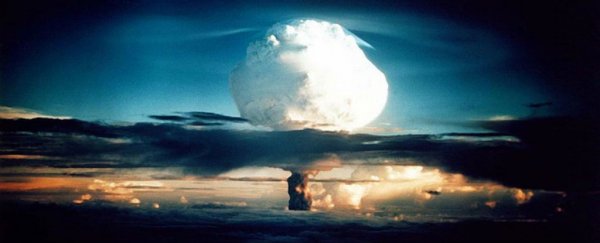Thanks to all our plastic pollution and nuclear testing, humans have cut short a 11,700-year-old geological epoch known as the Holocene, and have initiated a new, human-influenced epoch called the Anthropocene, experts say.
An international team of researchers recommended to the International Geological Congress in Cape Town, South Africa on Monday that the Anthropocene be officially declared, suggesting that its starting date should be 1950 - when nuclear tests created a new layer (or stratum) in Earth's surface.
The group of 35 experts, known as the Working Group on the Anthropocene, took a vote on whether we should officially call it quits on the Holocene, and 30 voted in favour of declaring a new geological era, while three voted against, and two were absent.
"The significance of the Anthropocene is that it sets a different trajectory for the Earth system, of which we of course are part," working group chair, Jan Zalasiewicz, a geologist from the University of Leicester in the UK, told the media.
"If our recommendation is accepted, the Anthropocene will have started just a little before I was born. We have lived most of our lives in something called the Anthropocene and are just realising the scale and permanence of the change."
If you want to define a new human-influenced geological epoch, it's not as simple as just listing all the ways that humans have irrevocably changed the experience of life on Earth.
Sure, we're directly causing species to go extinct, and warming the planet so much that Antarctica is crumbling - oh and let's not forget how scientists predicted that by 2050, there'll be more plastic than fish in the ocean. But in order to declare a new geological epoch, we have to have made, well, a geological impact. A big one.
As Damian Carrington explains for The Guardian, that geological impact must be global, and has to be significant enough to be clearly defined in the future geological record.
For example, you might assume that the end of the Cretaceous epoch 66 million years ago was marked by the mass death of all non-avian dinosaurs, but it's actually defined by a 'golden spike' in metal iridium sediments that can be seen in Earth's strata.
When that meteorite collided with Earth to initiate the rapid demise of the dinosaurs, massive amounts of metal iridium sediment blanketed the entire globe, creating a distinct geological signal for an event that would change the world forever.
Fast-forward to now, and our insistence on messing around with nuclear weapons over the past 70-odd years has already seen enough radioactive sediments settle into a new stratum in Earth's geological record, the Anthropocene working group argues.
"The radionuclides are probably the sharpest - they really come on with a bang. But we are spoiled for choice. There are so many signals," Zalasiewicz said, adding that micro-plastics are also components of sediment around the world, both on land and in the oceans.
The announcement backs previous research from a team of geologists at University College London in the UK who last year published a paper arguing that the Anthropocene is here, and we need to make it official.
As Fiona MacDonald reported for us in March 2015, rather than arguing that the start of the Anthropocene was as recent as 1950, they said it's been going on for much longer:
"[A]fter studying the environmental impact of humans over the past 50,000 years, researchers … have now not only confirmed that the new epoch is definitely here, they've also pinpointed that it started all the way back in 1610 - most likely as a result of Europeans colonising the Americas."
Regardless of when experts think it started, there's a definite movement towards making the Anthropocene official. So how does that happen?
Well, now that the group has voted on it, they'll begin investigations to make sure the start of the Anthropocene is scientifically valid. This will involve up to three years of site sampling and analysis to identify the most convincing Global Standard Stratigraphic Age (GSSA) for the beginning of the epoch - for example, 1950 or 1610 - which will be submitted as a formal proposal to the International Commission on Stratigraphy (ICS).
If approved by the ICS, it will need to be ratified by the Executive Committee of the International Union of Geological Sciences (IUGS) to make it official. So the working group is going to be busy in the coming years, but they're confident this is going to happen.
"Our stratigraphic colleagues are very protective of the geological time scale. They see it very rightly as the backbone of geology and they do not amend it lightly," Zalasiewicz told The Guardian. "But I think we can prepare a pretty good case."
